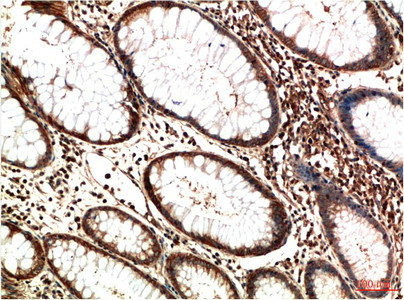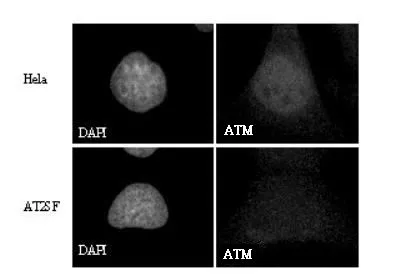![IHC-P analysis of human colon carcinoma tissue using GTX34046 ATM antibody [1D1]. Dilution : 1:200 IHC-P analysis of human colon carcinoma tissue using GTX34046 ATM antibody [1D1]. Dilution : 1:200](https://www.genetex.com/upload/website/prouct_img/normal/GTX34046/GTX34046_20200622_IHC-P_298_w_23060801_692.webp)
IHC-P analysis of human colon carcinoma tissue using GTX34046 ATM antibody [1D1]. Dilution : 1:200
ATM antibody [1D1]
GTX34046
ApplicationsImmunoHistoChemistry, ImmunoHistoChemistry Paraffin
Product group Antibodies
ReactivityHuman
TargetATM
Overview
- SupplierGeneTex
- Product NameATM antibody [1D1]
- Delivery Days Customer9
- Application Supplier NoteIHC-P: 1:100-1:200. *Optimal dilutions/concentrations should be determined by the researcher.Not tested in other applications.
- ApplicationsImmunoHistoChemistry, ImmunoHistoChemistry Paraffin
- CertificationResearch Use Only
- ClonalityMonoclonal
- Clone ID1D1
- Concentration1 mg/ml
- ConjugateUnconjugated
- Gene ID472
- Target nameATM
- Target descriptionATM serine/threonine kinase
- Target synonymsAT1, ATA, ATC, ATD, ATDC, ATE, TEL1, TELO1, serine-protein kinase ATM, A-T mutated, AT mutated, TEL1, telomere maintenance 1, homolog, ataxia telangiectasia mutated, serine/threonine kinase ATM
- HostMouse
- IsotypeIgG1
- Protein IDQ13315
- Protein NameSerine-protein kinase ATM
- Scientific DescriptionThe protein encoded by this gene belongs to the PI3/PI4-kinase family. This protein is an important cell cycle checkpoint kinase that phosphorylates; thus, it functions as a regulator of a wide variety of downstream proteins, including tumor suppressor proteins p53 and BRCA1, checkpoint kinase CHK2, checkpoint proteins RAD17 and RAD9, and DNA repair protein NBS1. This protein and the closely related kinase ATR are thought to be master controllers of cell cycle checkpoint signaling pathways that are required for cell response to DNA damage and for genome stability. Mutations in this gene are associated with ataxia telangiectasia, an autosomal recessive disorder. [provided by RefSeq, Aug 2010]
- ReactivityHuman
- Storage Instruction-20°C or -80°C,2°C to 8°C
- UNSPSC41116161

![IHC-P analysis of human breast carcinoma tissue using GTX34046 ATM antibody [1D1]. Dilution : 1:200 IHC-P analysis of human breast carcinoma tissue using GTX34046 ATM antibody [1D1]. Dilution : 1:200](https://www.genetex.com/upload/website/prouct_img/normal/GTX34046/GTX34046_20200622_IHC-P_268_w_23060801_232.webp)





![IHC-P analysis of mouse spleen tissue using GTX30636 ATM (phospho Ser1981) antibody [10H11.E12].](https://www.genetex.com/upload/website/prouct_img/normal/GTX30636/GTX30636_329_IHC-P_w_23060722_410.webp)
![IHC-P analysis of human breast carcinoma tissue using GTX34047 ATM antibody [4G9]. Dilution : 1:200](https://www.genetex.com/upload/website/prouct_img/normal/GTX34047/GTX34047_20200622_IHC-P_269_w_23060801_385.webp)
![IHC-P analysis of human breast carcinoma tissue using GTX34048 ATM antibody [3D3]. Dilution : 1:200](https://www.genetex.com/upload/website/prouct_img/normal/GTX34048/GTX34048_20200622_IHC-P_270_w_23060801_426.webp)